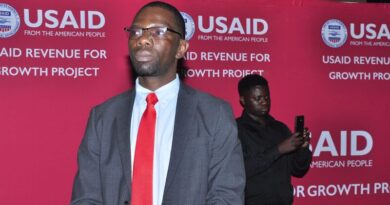SADC Utilizes Technology to Drive Financial Inclusion Initiatives
The Southern African Development Community (SADC) is intensifying efforts to promote financial inclusion and enhance access to finance within the region through the adoption of innovative technological solutions.
The SADC Financial Inclusion (FI) Subcommittee recently convened in Johannesburg, South Africa, on February 19th-20th, 2024, to assess progress on the implementation of the SADC Strategy on Financial Inclusion and Small to Medium Enterprises (SMEs) Access to Finance for the period 2023-2028.
The strategy aims to establish an inclusive, stable, and innovative financial system in the SADC region, empowering individuals and businesses to access quality financial services.
Mr. Sadwick Mtonakutha, Director of Finance Investment and Customs (FIC) at the SADC Secretariat, emphasized the pivotal role of technology in expanding financial access, increasing transaction volumes, ensuring financial integrity, and tracking the objectives of the strategy.
One of the key initiatives driving financial inclusion is the Support to Improving the Investment and Business Environment (SIBE) Programme, which collaborates with FinMark Trust to monitor financial and economic inclusion in the region.
Significant progress has been made, with 119 million individuals, representing 77% of adults in the region, having access to formal and informal financial products or services, compared to 57% in 2011.
To further enhance financial integration and inclusion, the SIBE Programme has developed the SADC Financial Inclusion Information Portal, serving as a central repository for financial inclusion data and facilitating cross-learning between Member States.
Additionally, the Payment System Subcommittee under the Committee of Central Bank Governors (CCBG) is reviewing and upgrading the SADC Mobile Money Guidelines to support the adoption of innovative payment systems. The Subcommittee is also working on initiatives such as the SADC-Real-Time Gross Settlement (RTGS) platform to facilitate cross-border payments and settlements in real-time.
Efforts to reduce the cost of cross-border remittances have resulted in a decrease from an average of 9.4% per transaction in 2019 to about 7.2% in 2021. Moreover, initiatives are underway to promote digital payment services and strengthen the participation of Small and Medium Enterprises (SMEs) in capital markets.
Furthermore, SADC is collaborating with the Industrialization and Women Economic Empowerment (IWEE) Project, funded by the German Government, to promote equitable access for women-owned businesses and entrepreneurs through the Financial Inclusion Gender Action Plan.
With the adoption of the new Five-Year Strategy on Financial Inclusion and SMEs Access to Finance (2023-2028), SADC is directing efforts towards implementing regional and national agendas. Thirteen Member States are currently developing and implementing National Financial Inclusion Strategies or Roadmaps in alignment with the new strategy.
Additional source: SADC Secretariat



